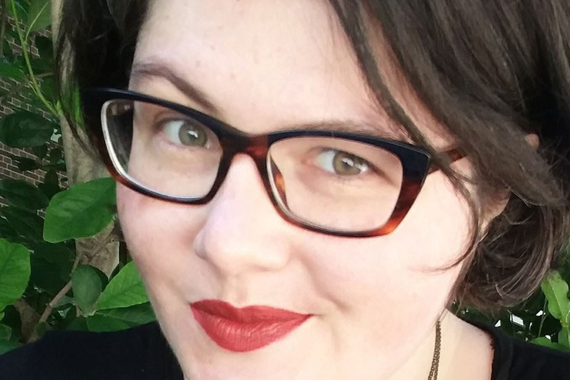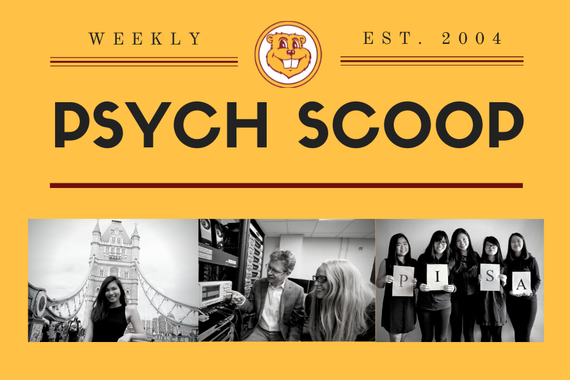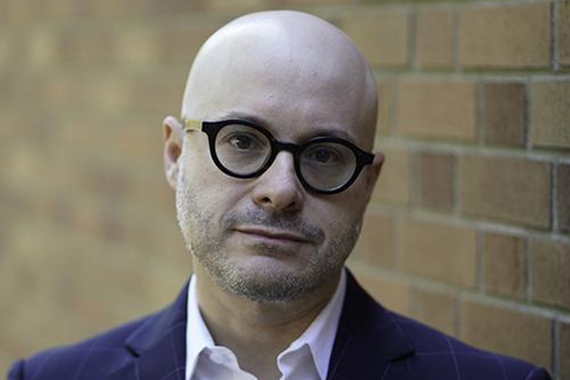Psych Scoop, 1/17/23
January 17th, 2023 - Welcome Back!
The Psych Scoop is sent to all Psychology Undergraduate students and alumni every Tuesday throughout the academic school year.
Share your news with psyadvis@umn.edu!
Psychology Advising Announcements
Current majors are expected to know the announcements in the advising announcement section.
Feedback for the department? Check out our suggestion box.
1. Beginning of Semester Announcements
Welcome back! As we begin the new semester, it's important to know what resources and support are readily available to students. The Psychology Undergraduate Advising Office will be holding Drop-In hours which are great for addressing quick 5-10 minute questions or concerns related to psychology Majors/Minors. We hold Drop-In hours consecutively for the first two weeks of classes and will resume our regular Drop-In schedule starting Tuesday, January 31st. For a full appointment, please complete a request form or email our staff at psyadvis@umn.edu with questions.
2. Psychology Engagement Award - Spring Application Now Open
Are you volunteering in your community this Spring? Or, participating in an unpaid internship here or abroad this semester? The Department of Psychology's Donor Awards for Psychology Undergraduate Engagement are available to support you! The purpose of these awards is to encourage and support psychology majors who engage in unpaid learning experiences beyond the University campus and classroom environments (i.e. unpaid internships, volunteer experiences, study abroad containing a psych-related internship, etc.). Up to three awards of $500 will be offered for Spring 2023. The application deadline is Wednesday, February 8th (12:00 pm CST). For details about the awards and application materials, visit our webpage.
Courses of Interest
3. PSY 4960 - 002: Introduction to Open Science - 3 Credits - Spring 2023
Open Science has become a term more frequently used in psychological research. Though the term has no single definition, it refers to processes that allow for more transparent and more accessible research. How do we incorporate open science into our research? In this class, students will gain an understanding of what open science is, why it is important to consider open science principles in our research, and how to use open science tools. Specifically, the course will begin by discussing the history of psychological research and the replication crisis and will move into identifying open science principles and associated tools. Students will gain hands-on experience with preregistration, reproducing analyses in R, and replicating findings from psychological studies. This course will require both group work and independent work to gain a deeper understanding of open science principles. Though not required, a basic understanding of R programming will be helpful for this course. It is strongly suggested that students take PSY 3801: Introduction to Psychological Measurement and Data Analysis before taking this course, but it is not required.
PSY 4960 - 002 will meet in Bruininks Hall 131B, Tuesdays, and Thursdays from 9:00 am - 11:30 am CST
Instructor: Dr. Amanda Woodward
Note: This course counts as elective credit for the Psychology majors only.
4. PSY 4960 - 003: Race and the Developing Child - 3 Credits - Spring 2023
In this course, students will review racial, ethnic, and cultural (hereafter: REC) diversity in child and youth development and how this diversity influences their lives. Students will learn about the long history and recent resurgence of research into the role of REC contexts for children and adolescents. This research often challenges popular notions while revealing broader themes regarding the role of REC in development. Consequently, the main goal of this course is for students to learn about these research findings and draw implications for child and youth development, particularly for those populations who are stigmatized due to racial, ethnic, and cultural status. A second main goal of the course is for students to learn about the developmental progression in how children and youth make sense of the REC aspects of their lives and social worlds. Students can apply this knowledge to design developmentally-sensitive programming and dialogues with children and youth. A third goal of this course is for students to develop an understanding of broad themes and principles that are consistent across REC contexts but may be expressed differently in specific REC contexts. these broad themes include ethnic/ racial stigmatization, cultural socialization, and REC identity development which are expressed differently in each ethnic, racial, and cultural context. The fourth goal of the course is for students to gain skills in understanding how themes associated with a particular REC group are expressed uniquely by individuals. No enforced prerequisites, PSY 3001W or equivalent recommended.
PSY 4960 - 003 will meet in Elliott Hall N647(new room), Tuesdays from 5:00 pm - 7:30 pm CST
Instructor: Dr. Juan Del Toro
Note: This course counts as elective credit for the Psychology majors only.
Events
5. Boynton Health's Nutritious U Food Pantry
Tuesday, January 24, 2023 - Thursday, January 26, 2023 12:00 pm- 6:00 pm CST
Cost: Free
Location: 103A Memorial Union
Boynton Health's Food Pantry is open the last week of every month during the semester (Tuesday, Wednesday, and Thursday), from 12:00 pm- 6:00 pm CST on the 1st floor of Memorial Union (Room 103A), across the lounge from the theater. Any student can visit the food pantry, no proof of need is required. Students choose from available food items when they show up. Learn more about the pantry on Boynton's website.
Research
6. *Credit or Volunteer* RA Position with Teen Depression Treatment Study
We are looking for student RAs to work on the Adaptive Treatment for Adolescent Depression Study in Child Psychiatry. The research project evaluates the effectiveness of personalized interventions for adolescent depression delivered in community mental health care settings. Students will also have the chance to work on other ongoing projects related to teen mental health in the lab. Primary responsibilities will include administering data collection procedures with adolescents and parents and data entry. In addition, students will attend a 1-hour bi-weekly Zoom meeting. Candidates must be pursuing a degree in Psychology or a related field and be willing to commit 4 hours per week for the semester, including some weekday evenings and weekend mornings. Preference will be given to students who can commit to more than 1 semester and summer availability. Students can earn 1-3 credits of PSY 4/5993. To apply, please send a cover letter and rescue (including GPA and class year) to ptad@umn.edu. For more information about the position, please visit the website.
7. *Volunteer* Undergraduate Volunteer Research Assistant in Alcohol-Anxiety Laboratory
The laboratory of Dr. Matt Kushner is looking for an undergraduate volunteer to assist in an ongoing NIH supported study in the Department of Psychiatry. The purpose of the study is to test a computer-delivered therapy for alcohol use disorder and anxiety in patients undergoing addiction care at Fairview-Riverside. Primary responsibilities include data entry, conducting patient-participant appointments, and assisting in other study-related tasks as needed. Training and supervision for these tasks will be provided. The ideal candidate would be a senior in psychology (or related) major, be willing to establish a set 10 hours per week work schedule (preferably in the afternoons), and be able to commit to working in the lab for one year. Depending upon availability and performance, it is possible that the volunteer position could lead to a paid research assistant position. If you are interested, please email a copy of your resume and unofficial transcript to Lilly Hartnett at hartn077@umn.edu.
8. *Credit (CPSY 4994 Credit)* RA Position in Development Social Cognitive Neuroscience Lab, ICD
The primary research interests of the Carlson and Zelazo Lab center on the development of executive function skills including attention, working memory, inhibitory control, cognitive flexibility, and reflection. We conduct both basic and applied research on executive function from infancy to adolescence. Research lab tasks include recruiting family participants over email and phone, transcribing interviews, video coding, greeting families, testing children, and helping with data entry analysis. Requirements include having a strong interest in child development, especially brain and cognition, fast learner and having a strong motivation to gain research experience, strong GPA, being organized, commitment to working in the lab for more than one semester, and having summer availability. For more details and to apply, click here.
Graduate School
9. Carlson Early Career Graduate Programs Virtual Open House Webinars *Today!*
Tuesday, January 17, 2023, 5:00 pm - 6:30 pm CST
Cost: Free
Location: Online
Are you about to graduate from your undergraduate program or have recently graduated? Stop by the Carlson School of Management's Early Professional Program Virtual Open House! Learn about each of our graduate programs and have access to our entire recruitment team for Q&A and application tips! To register for the Virtual event, click here!
Engagement Opportunities
10. Sukoon Helpline Respondent - Volunteer Opportunity
Sukoon: Healing of the Minds is a nonprofit that strives to provide culturally informed, holistic support and resources to meet the needs of Minnesota's uniquely diverse communities. We do this through community conversations and services such as the Sukoon Helpline, a free and confidential Helpline open to all, operating from 7:00 pm - 7:00 am, 7 days a week. A Sukoon Helpline Respondent is a volunteer who is responsible for responding to text messages and calls remotely via the Helpline communication platform with the purpose of providing emotional support, de-escalating crisis situations, and providing appropriate referrals and resources to users during helpline operating hours. This volunteer program is an excellent opportunity to make a difference in others' lives while gaining interpersonal communication skills, building emotional intelligence, and learning mental health first-aid skills ALL individuals can benefit from. No background in mental health is needed, and all necessary training will be provided. All you need is a secure personal laptop, a strong internet connection, a weekly 4-hour time block to work a scheduled shift, and the desire to touch others' lives through empathy and support. For questions or more information, check out our website, or reach us at info@sukoonhealingoftheminds.org. Please do not hesitate to reach out with any questions or inquiries. Apply today or share the opportunity with someone who might.
Jobs/Internship Opportunities
IMPORTANT: Organizations listed below are not necessarily affiliated with or endorsed by the Department of Psychology or Psychology Undergraduate Advising. Please exercise the same discretion you would in viewing any other source.
11. Research Professional 1 - PARKS Study
The PARKS study is hiring fluent Spanish speakers for recruitment and data collection. This study uses fee waivers and family outreach to promote youth use of park and recreation programs that support physical activity. It is a partnership between the University of Minnesota, the Minneapolis and St. Paul Park systems, and parks serving lower-income diverse youth and families. We need one or more friendly people to help us recruit and collect data from Spanish-speaking/English-speaking parents and children. Recruitment involves attending community activities to share information about the study. Data collection includes obtaining consent (explaining the study process) and doing surveys in English and Spanish. Late afternoon hours will be common. 10-14 hours per week (flexible). The pay range is $20-$24/hr. Interested? Please contact Reed Mitchell by email at mitc0186@umn.edu or read more online.
12. Postgraduate Associate - Yale University
Our Developmental Psychopathology and Social Neuroscience Fellowship position will support the implementation of research protocols focused on autism spectrum disorder (ASD) and other developmental disorders. Research Fellows have opportunities to be involved in aspects of each study ranging from implementation of novel behavioral, eye-tracking, psychophysiological, and neuroimaging (fNIRS) experiments, to participating directly in subject characterization by conducting structured parent interviews and assessing participants, to data processing and analysis. Fellows will receive training in the administration of novel behavioral paradigms, eye-tracking, and psychophysiological sensing technologies. The position is one year in duration with a salary of $38,000.00. Postgraduate positions are open to those who will have received a bachelor's and/or master's degree before beginning the position, but not doctoral degrees. Reappointment to a second year may be possible and will be determined 4-6 months before the end date. The anticipated start date is July 2023. This is not a remote opportunity. This position is located at the Child Study Center on the campus of Yale University in New Haven, CT. The program is led by Dr. Kasia Chawarska and co-directed by Drs. Suzanne Macari, Kelly Powell, ad Angelina Vernetti. For more information on the application process, visit the lab website.
13. Job Opening for Psychology/Neuroscience *Full-Time* Research Assistant at Virginia Tech
A full-time research assistant is being sought to support multiple NIH-funded projects in the labs of Dr. Pearl Chiu (lab information) and Dr. Brooks King-Casas (lab information) at the Fralin Biomedical Research Institute at Virginia Tech Carilion in Roanoke, Virginia. Projects in the labs are highly interdisciplinary and combine methods from experimental and clinical psychology, neuroscience, and behavioral economics with functional neuroimaging and Vivo electrochemistry to investigate decision-making in healthy and clinical populations (focusing on adults with mood, anxiety, personality, or substance-use disorders, and at-risk youth). Training will be provided for all aspects of the job. This is an excellent opportunity for those interested in graduate school in clinical or cognitive psychology/neuroscience. Those who are interested can also visit their website, and search for job posting #524168.
14. Research Professional 1 - University of Minnesota
The Division of Epidemiology and Community Health in the School of Public Health is seeking applications for a full-time (40 hours per week) Research Professional 1 to work on the Aging and Cognitive Health Evaluation in Elders (ACHIEVE) Study. ACHIEVE is a multi-site study of individuals who were 70-84 years old when they were recruited in 2018-2019. Participants are being followed until the end of 2025, and possibly beyond, to better understand risk factors for cognitive decline and dementia. Data collection is in-person, Monday-Friday, 8:00 am to 4:30 pm, at the Epidemiology Clinical Research Center (ECRC) located at 1100 S. Washington Ave in Minneapolis. Starting salary is $20.00-$24.04 per hour ($41,600-$50,000 annually) depending on relevant experience and education. Training on all data collection activities will be provided. Preference will be given to those with experience in face-to-face collection of research data. Special preference will be given to candidates with experience in psychometric or cognitive testing. External applicants may apply here, and Internal applicants may apply here.


